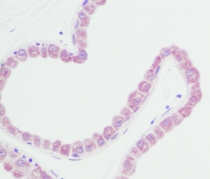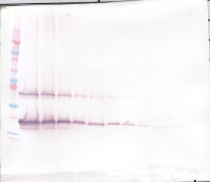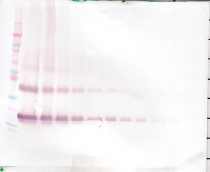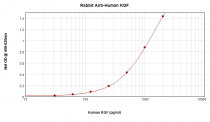ARG56686
anti-KGF antibody
anti-KGF antibody for ELISA,IHC-Formalin-fixed paraffin-embedded sections,Neutralizing,Western blot and Human,Rat
Overview
| Product Description | Rabbit Polyclonal antibody recognizes KGF |
|---|---|
| Tested Reactivity | Hu, Rat |
| Tested Application | ELISA, IHC-P, Neut, WB |
| Host | Rabbit |
| Clonality | Polyclonal |
| Isotype | IgG |
| Target Name | KGF |
| Antigen Species | Human |
| Immunogen | E.coli derived Recombinant Human KGF. (CNDMTPEQMA TNVNCSSPER HTRSYDYMEG GDIRVRRLFC RTQWYLRIDK RGKVKGTQEM KNNYNIMEIR TVAVGIVAIK GVESEFYLAM NKEGKLYAKK ECNEDCNFKE LILENHYNTY ASAKWTHNGG EMFVALNQKG IPVRGKKTKK EQKTAHFLPM AIT) |
| Conjugation | Un-conjugated |
| Alternate Names | FGF-7; Fibroblast growth factor 7; Heparin-binding growth factor 7; KGF; Keratinocyte growth factor; HBGF-7 |
Application Instructions
| Application Suggestion |
|
||||||||||
|---|---|---|---|---|---|---|---|---|---|---|---|
| Application Note | * The dilutions indicate recommended starting dilutions and the optimal dilutions or concentrations should be determined by the scientist. |
Properties
| Form | Liquid |
|---|---|
| Purification | Affinity purification with immunogen. |
| Buffer | PBS (pH 7.2) |
| Concentration | 1 mg/ml |
| Storage Instruction | For continuous use, store undiluted antibody at 2-8°C for up to a week. For long-term storage, aliquot and store at -20°C or below. Storage in frost free freezers is not recommended. Avoid repeated freeze/thaw cycles. Suggest spin the vial prior to opening. The antibody solution should be gently mixed before use. |
| Note | For laboratory research only, not for drug, diagnostic or other use. |
Bioinformation
| Database Links | |
|---|---|
| Gene Symbol | FGF7 |
| Gene Full Name | fibroblast growth factor 7 |
| Background | The protein encoded by this gene is a member of the fibroblast growth factor (FGF) family. FGF family members possess broad mitogenic and cell survival activities, and are involved in a variety of biological processes, including embryonic development, cell growth, morphogenesis, tissue repair, tumor growth and invasion. This protein is a potent epithelial cell-specific growth factor, whose mitogenic activity is predominantly exhibited in keratinocytes but not in fibroblasts and endothelial cells. Studies of mouse and rat homologs of this gene implicated roles in morphogenesis of epithelium, reepithelialization of wounds, hair development and early lung organogenesis. [provided by RefSeq, Jul 2008] |
| Function | Plays an important role in the regulation of embryonic development, cell proliferation and cell differentiation. Required for normal branching morphogenesis. Growth factor active on keratinocytes. Possible major paracrine effector of normal epithelial cell proliferation. [UniProt] |
| Calculated MW | 23 kDa |
Images (4) Click the Picture to Zoom In
-
ARG56686 anti-KGF antibody IHC-P image
Immunohistochemistry: Formalin-fixed and paraffin-embedded sections of normal Human skin. The recommended ARG56686 anti-KGF antibody concentration is 0.5 µg/ml overnight at 4°C. An HRP-labeled polymer detection system was used with a non-alcohol soluble AEC chromogen. Antigen Retrieval: Incubate tissue section in a buffer (proteinase K) at RT for 10 min.
-
ARG56686 anti-KGF antibody WB image
Western blot: 250 - 0.24 ng of Human KGF stained with ARG56686 anti-KGF antibody, under reducing conditions.
-
ARG56686 anti-KGF antibody WB image
Western blot: 250 - 0.24 ng of Human KGF stained with ARG56686 anti-KGF antibody, under non-reducing conditions.
-
ARG56686 anti-KGF antibody standard curve image
Sandwich ELISA: ARG56686 anti-KGF antibody as a capture antibody at 0.5 - 2.0 µg/ml combined with ARG56795 anti-KGF antibody (Biotin) as a detection antibody. Results of a typical standard run with optical density.









